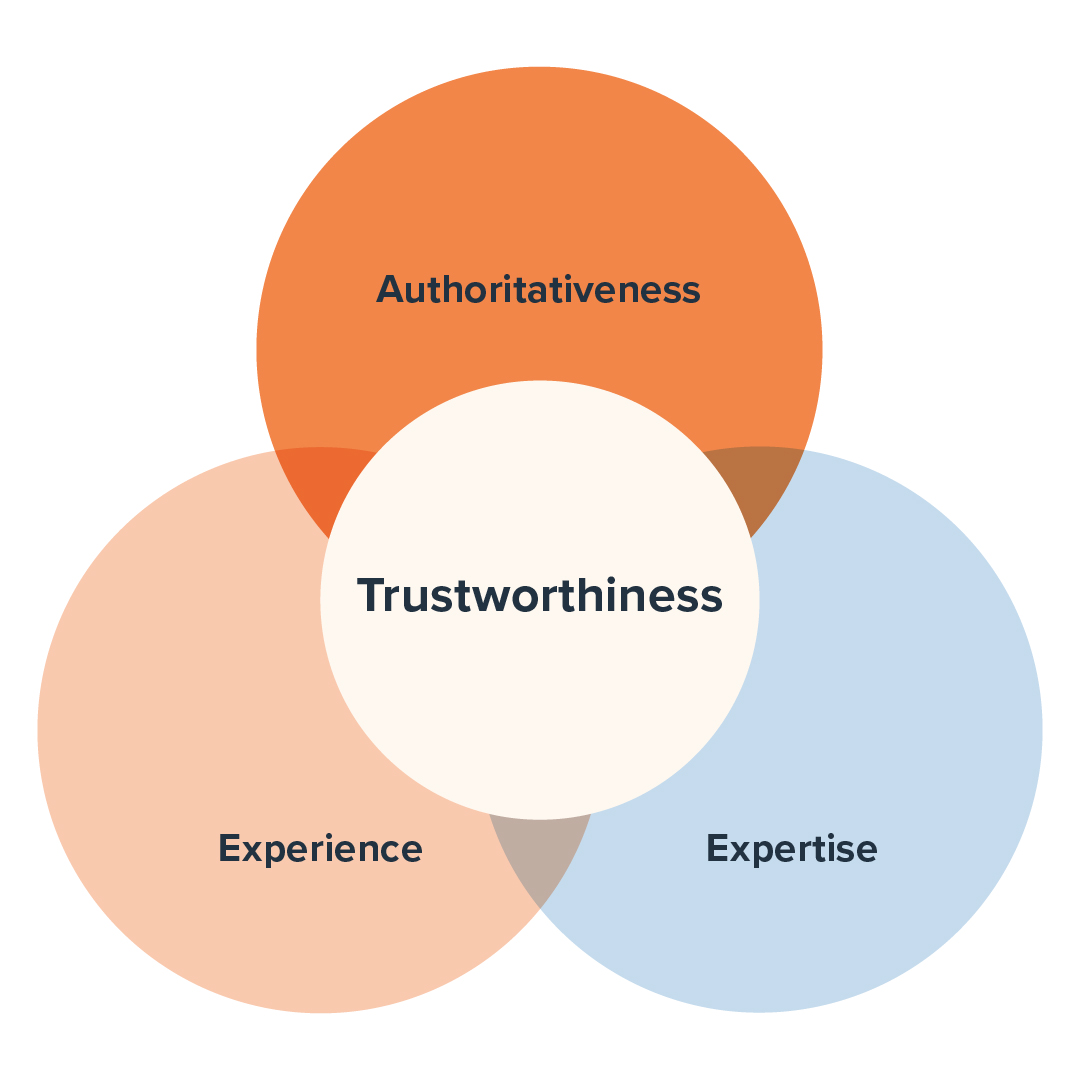In December 2022, Google updated its Search Quality Rater Guidelines from Google E-A-T to Google E-E-A-T, adding a new “E” for “experience.” See what this change means for SERP rankings in 2024, and how you can optimize your website for E-E-A-T to rank better in organic search results.
- What Is Google E-E-A-T?
- Why Google’s E-E-A-T Update Matters in 2024
- How Are Google E-E-A-T Signals Measured?
- Why Use Google E-E-A-T for SEO?
- How to Optimize for Google E-E-A-T

What Is Google E-E-A-T?
Google E-E-A-T is an acronym for experience, expertise, authoritativeness, and trustworthiness—four guidelines that the search engine uses to evaluate the quality of a website and provide better search results to its users.
Though E-E-A-T is not a direct ranking factor, these guidelines do significantly impact your content’s performance on the SERP. Google rewards valuable, high-quality content that demonstrates:
- Experience: The creator’s firsthand experience with the topic (e.g., a review from a person who has used the product versus someone who hasn’t).
- Expertise: The creator’s knowledge and qualifications necessary to give dependable information on the topic (e.g., medical advice from a doctor versus a parent’s blog).
- Authoritativeness: The creator’s reputation in their industry (e.g., SEO consultants claiming to help clients with performance versus sharing case studies and hard data).
- Trustworthiness: The creator’s content is factually accurate, reliable, and user-friendly. This includes transparency (e.g., websites including a disclosure of use when collecting personal data).

Trustworthiness is partially shaped by the other three aspects of Google E-E-A-T. By demonstrating experience, expertise, and authoritativeness well, you’re already on your way to establishing trust with your audience.
Why Google’s E-E-A-T Update Matters in 2024
Now that artificial intelligence (AI) has become a major player in online content, Google is considering how that will play into the “experience” factor of E-E-A-T, since AI can’t have true life experiences.
As it stands, Google still prioritizes content that hits on trustworthiness, authoritativeness, and expertise. The focus is on the essence of the content itself, not how it was created. If your objective is to provide valuable, relevant content, you won’t be penalized for utilizing AI as long as you don’t rely on it for every piece of content on your website.
How Are Google E-E-A-T Signals Measured?
Search Quality Raters are third-party contractors who use E-E-A-T guidelines to evaluate websites that appear in Google search results. They assess a website’s content, author, and publisher.
Search Quality Raters pay extra attention to “Your Money or Your Life” (YMYL) content—information that could have real effects on a user’s life (e.g., current events, health, law, finance, and more)—because misinformation on these topics can cause serious harm to users.
Due to all the factors that contribute to a website’s E-E-A-T signals, including subjective determinants from raters, you can’t measure your own E-E-A-T levels.
Why Use Google E-E-A-T for SEO?
According to Molly, a Senior SEO Strategist at Hurrdat Marketing,
“Google has been using E-A-T signals since at least 2014 to distinguish high-quality, helpful content from pieces only written to boost SERP rankings.”
Good Google E-E-A-T signals are what sets your website apart from competitors and why users would choose to read yours over another. With these positive signals, you’re more likely to appear higher in SERPs and, therefore, get more traffic and visibility to your content. Plus, high E-E-A-T signals prevent Google from penalizing your website for being fraudulent or spam.
How to Optimize for Google E-E-A-T
If you’re looking to boost your website’s E-E-A-T signals for SEO purposes, you must demonstrate high levels of experience, expertise, authoritativeness, and trustworthiness. Use these suggestions to optimize for each of the four letters in E-E-A-T.
Experience
Experience proves to the reader that you personally have tried/tested whatever you’re writing about. Firsthand experiences can make up for a lack of credentials on the topic. For example, you don’t have to work for Apple to write a truthful review of their latest iPhone if you own it and have used it.
- Give specific, authentic, and unique details in your content. Add evidence of real-life, human experience to any AI-generated copy.
- Collaborate with other experts on the topic. Include quotes or testimonials from specialists or influencers who also have credentials in this area.
- Showcase the people behind your organization. Include author bios on blog content and real headshots on your “About Us” webpage.
Expertise
As AI content becomes more prevalent, displaying your expertise becomes especially critical in establishing your content as valid and credible. Sometimes, expertise and experience can overlap, but they aren’t the same thing.
- Create accurate content. Ensure what users are reading is relevant, reliable, and up-to-date by fact-checking all content and citing reputable sources when applicable.
- Be honest about your failures and share tips for success on your website, especially for YMYL content. Lead by example!
- Build a professional “About Us” page—including your team’s qualifications, certifications, awards, years of experience, and other relevant achievements. Similarly, showcase your previous work throughout your website.
- Add a writer’s byline to your content and add any relevant social media links to provide another layer of expertise.
Molly adds,
“Google often ranks content higher in SERPs when it’s contributed to or written by accredited professionals with many signals of expertise, especially for ‘your money, your life’ topics. Linking social proof of expertise, like professional social media profiles or websites, can help Google crawl, verify, and catalog your expert contributors.”
Authoritativeness
To what extent are you a reliable source on the topic? Google evaluates qualifications of authority in a field based off who the writer is, whether they have a good reputation for giving credible information on the topic, and how their content is represented on the website.
Molly further explains,
“Google determines authoritativeness on a topic-by-topic basis for content, creators, and entire websites. It takes time to prove you’re a go-to authority on a subject. Strategize your brand’s most authoritative topics, then publish enough high-quality content in those areas, and you may reap the rewards in SERP rankings.”
- Develop a content strategy with only a few primary topic clusters and update your content frequently to share the latest insights and information.
- Prioritize link-building strategies. Backlinks, or links on other websites leading to yours, are like online endorsements showing Google that others think you’re an authority on a particular topic. Creating quality content will help you gain backlinks from other reputable sites.
- Incorporate internal links to relevant content on your website. This will give readers further context and show you know even more about the topic.
- Demonstrate thought leadership. Write blogs, present new ideas, and ask original questions whenever possible.
- Provide case studies on your website for easy-to-understand pieces of content that demonstrate a real-life scenario your business has been in and the steps that were followed to resolve the issue. These prove you deliver professional results to customers in various situations.
Trustworthiness
According to Google’s Search Quality Evaluator Guidelines, “Trust is the most important member of the E-E-A-T family because untrustworthy pages have low E-E-A-T no matter how experienced, expert, or authoritative they may seem.” Here’s what you can do to build trust with users.
- Upload high-resolution visuals that are appropriate for your content. Optimized images are easy on the eyes and load quicker for users. A user-friendly website shows that you care about its visitors and their experience.
- Get an SSL (Secure Sockets Layer). This certificate signals to search engines and visitors that users’ online security and privacy are not just considered, but actively protected.
- Use paid influencers to promote your website or product sparingly. Many users consider paid opinions to be unreliable. Instead, opt for user-generated content when possible.
- Utilize testimonials. If you have direct quotes, positive social media mentions, or reviews from real people about your brand, mention these across your website to illustrate your competence.
- Do not keyword stuff. The Search Quality Raters will read your content to see whether it’s truly answering the query or just pretending to with black hat SEO tactics.
- Positively discuss your business online. Write in a friendly, knowledgeable way, and always respond to negative reviews calmly, constructively, and with appreciation.
If you need to optimize your website for Google E-E-A-T, Hurrdat Marketing offers services such as search engine optimization and website design that can help. Contact us today to learn more!




